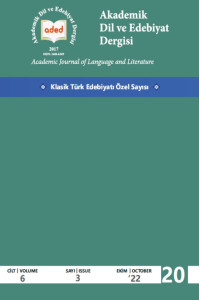Nazirecilik Geleneğinde Ben ve Ötekinin İzleri: Gelibolulu Âli’nin Biz Redifli Şiiri İle Ona Yazılan Nazire Şiirler Örnekleminde Ben’in Biz Yolculuğu
Abstract
Klâsik Türk şiirinde nazirecilik geleneği kapsamında, aynı veya benzer şiirlerin/eserlerin yazıldığı bilinmektedir. Bu tür şiirler, temelde örnek veya model bir şiirin benzerini veya daha güzelini yazma esasına dayanır. Birçok yönden benzerlik gösteren bu şiirlerin aynı duygu, hayal, düşünce ve hedefleri göstermesi ayrıca önemlidir. Bir yönüyle, model şiirin; benzerini/nazireyi kaleme almaya çalışan diğer şairlere ilham kaynağı veya tercüman olduğu düşünülebilir. Model şiirin mahiyeti, kendini ifade etmeye çalışan diğer şairlere bir yol gösterici özelliği taşır. Ayrıca kendini bu model şiir vasıtasıyla tanımlamak, konumlandırmak ayrı bir duygu ve histir. Yaşanılan çevrenin bir yansıtıcısı olan şiirlerin benzer konuları işlemesi tarihsel açıdan kayda değerdir. Bir sanatçının kendine dair bilgileri aktarması, aynı şiir etrafında başkalarının da kendine dair iz bulması ve bu sayede kendini ifade etmesi sanatçıların verdikleri bilgilerin ve duyguların gerçekliklerinin ve aldıkları tepkilerin bir tezahürü olması açısından önem arz eder. Nazire şiirler etrafında, her şairin kendi “ben”ini “biz” unsuru ile anlatması söz konusudur. Bir yönüyle, model şiir etrafında birleşen “benler”, biz şuuru oluştururlar. Bu unsur, kendi içinde, birliktelik yönüyle bir ilişki ağı kurarken esasında çevrelerindeki ötekileri de aktarmış/anlatmış olmaktadırlar.
Şaire ait bilgileri içermesi yönüyle şiirlerde birçok im, işaret ve belirti bulunur. Ben ve biz kelimelerinin geçtiği ifadeler, şairlere ait özellikleri açıklayan hususların başında gelmektedir. Gelibolulu Mustafa Ali’nin “biz” redifli şiiri de bu bağlamda değerlendirilebilecek türden olup tarihsel verilerle de desteklenebilir cinstendir. Bu şiir, Ali’nin şahsî tutum ve davranışlarına, dünya görüşüne, hayallerine, duygularına ait ipuçları da taşır. Ali’nin bu şiirine benzer olarak kaleme alınan şiirler, hem şairlerinden izler taşıması hem de “biz” redifi etrafında “ben” ve “öteki”ne ait unsurları barındırması açısından önemlidir. Bu makalede, Gelibolulu Mustafa Ali’nin bahse konu şiiri ve ona yazılan nazireleri, öncelikle nazirecilik geleneği çerçevesinde ardından içerik analizi kapsamında ben ve öteki unsurlarını aktarmaları yönüyle değerlendirilmeye çalışılacaktır.
Keywords
nazire ben biz öteki Gelibolulu Mustafa Ali nazire geleneği.
References
- AMBROS, Edith Gülçin (2014), Geleneksel “Ben” İle Bireysel “Ben” Çelişkisi ve Gelibolulu Mustafa ÂlÎ, GELİBOLULU MUSTAFA ÂLÎ ÇALIŞTAYI BİLDİRİLERİ 28-29 Nisan 2011 Yayıma hazırlayan İ. Hakkı AKSOYAK, s. 65-73
Traces Of The I And The Other In The Nazires (=Similar Poetry): The Journey Of I To We In The Example Of Mustafa Ali's Poetry And The Nazires written for his poetry With "We" Redıf (=Rhyme)
Abstract
It is known that the same or similar poems/works were written within the scope of nazire tradition in classical Turkish poetry. Such poems are basically based on writing a similar or better example of a sample or model poem. It is also important that these poems, which are similar in many ways, show the same feelings, dreams, thoughts and goals. In one aspect, the model poem; It can be thought that it was a source of inspiration or an interpreter for other poets who tried to write a similar poetry. The content of the model poem is a guide for other poets trying to express themselves. In addition, defining and positioning oneself through this model poem is a reflection of different emotions and feelings. It is historically significant that the poems, are a mirror of the living world, can deal with similar subjects. It is important that a poet conveys information about himself, that others find traces of themselves around the same poem, and that they express themselves in this way, in terms of being a manifestation of the reality of the information and feelings given by the poets and the reactions they receive. In the context of nazire poetries, it is possible for each poet to describe her/his "I=self" with "we". In one sense, the " personalities" united around the model poem, form the we-consciousness. While this situation establishes a network of relations in terms of togetherness, they actually convey/describe the others around them
There are many signs and indications in the poems in terms of containing the information about the poet. The expressions in which the words "I" and "we" are used are at the forefront of the issues that explain the characteristics of the poets, Gelibolulu Mustafa Ali's poem with "we" redif (rhyme, repeated voices), can be evaluated in this context and can be supported by historical data. This poem also carries clues about Ali's personal attitudes and behaviors, worldview, dreams and emotions. The poems written similar to this poem of Ali are important in that both carry traces of their poets and contain the elements of "I" and "other" around the "we" redif. In this article, the poem of Gelibolulu Mustafa Ali from and the nazires written to his poem will be evaluated in terms of conveying the self/I and other elements within the framework of the nazire tradition and then the content analysis.
Keywords
References
- AMBROS, Edith Gülçin (2014), Geleneksel “Ben” İle Bireysel “Ben” Çelişkisi ve Gelibolulu Mustafa ÂlÎ, GELİBOLULU MUSTAFA ÂLÎ ÇALIŞTAYI BİLDİRİLERİ 28-29 Nisan 2011 Yayıma hazırlayan İ. Hakkı AKSOYAK, s. 65-73
Details
| Primary Language | Turkish |
|---|---|
| Subjects | Literary Studies |
| Journal Section | Articles |
| Authors | |
| Publication Date | October 30, 2022 |
| Submission Date | August 31, 2022 |
| Acceptance Date | October 28, 2022 |
| Published in Issue | Year 2022 Volume: 6 Issue: 3 |
This work is licensed under Attribution-NonCommercial 4.0 International


